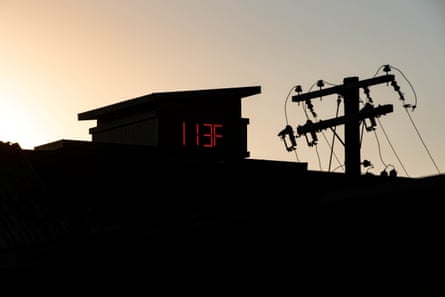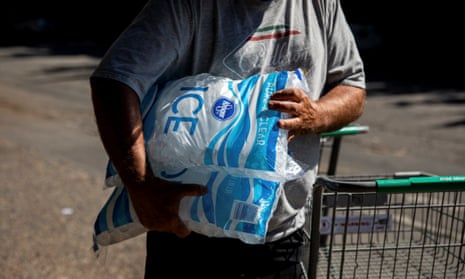The Pacific north-west, known for its moderate climate, is experiencing a record heatwave. The temperatures have driven crowds to the region’s beaches, pools and air-conditioned hotels, as residents in a region with few air-conditioned households try desperately to get some relief.
Here’s what you need to know:
What’s going on?
A heatwave has engulfed the region, with both Portland and Seattle breaking record high temperatures (Portland hit 112F [44C], while Seattle hit 104F) over the weekend. Seattle has reached 100F for three consecutive days – a first for the typically overcast city. Washington state surpassed its all-time high for June, with at least one part of the state reaching 115F on Sunday.
In many areas outside these metropolitan hubs, temperatures were even more extreme. Canby, in north-western Oregon, for example, hit 118F over the weekend, according to Nick Bond, the Washington state climatologist. At the same time, Spokane, Wenatchee and Pullman, Washington, each beat their previous record high for overnight temperatures, according to the National Weather Service.
The air quality has also become a concern in some areas. On Monday, the Puget Sound clean air agency tweeted that the extreme heat had resulted in the air quality in the Cascade foothills becoming “unhealthy”.
A heat warning was in effect for most of western Canada, too. The country set its highest recorded temperature on Sunday, when the village of Lytton hit 115F (46.1C).

Why is this happening?
The heatwave was caused by two pressure systems, one coming from the Aleutian Islands in Alaska, and the other from James Bay and Hudson Bay in Canada, explained Richard Bann, a meteorologist with the National Weather Service’s Weather Prediction Center.
“The Pacific north-west got caught in a region where a series of feedbacks set up these very warm temperatures – no, hot temperatures – with very little cloud cover and very warm temperatures at night too,” he said.
And these types of extreme hot weather events are being exacerbated by global heating.
The heatwave is being described as a “heat dome”. The term refers to the idea that this type of warmth extends high into the atmosphere and isn’t just a thin layer, and that it can have an impact on pressure and wind patterns. “That is important here in the Pacific north-west with the present event because it has served to essentially shut off the flow of cool marine air off of the Pacific into the land area,” Bond said.
How unusual is it?
Bond said similar events didn’t happen often, taking place every one to three decades.
“It blows my mind that we could get the temperatures that we’re observing here in the Pacific north-west, especially on the west sides of the Cascades that [have] that proximity to the ocean, that it could get that hot for so many days in a row,” he said. “I would have been willing to guess something like that in the middle of the century, in the latter part of the century.”
Why has this been so concerning?
These temperatures, while certainly not the worst in the country, are particularly detrimental for this region. The area isn’t used to this and hasn’t adapted to these types of temperatures, explained Bond.
“When it gets really hot here, we haven’t learned how to deal with it the same way other parts of the country have,” he said.

He gave the example of a colleague whose apartment in Seattle reached 100F. When she looked for an air-conditioned hotel, she found most in and around Seattle sold out, and the ones that weren’t were charging hundreds of dollars for a single night.
How long will it last
Relief is on its way for some parts of the region, including Seattle and Portland, according to Bond. But they will probably still experience higher temperatures than normal over the next two weeks. That type of prolonged heat could be dangerous when it came to wildfires and extremely detrimental for land agriculture, he said.
But Bann said further inland, it would continue to be very hot, with temperatures around 113F in some areas. He said those areas would probably see high temperatures continuing into the middle or later part of this week.
How are people coping?
Across the region, residents are turning to cooling centers, beaches, pools and hotels to get some relief.
On Sunday, Seattle’s mayor, Jenny Durkan, announced the opening of the Amazon Meeting Center as a cooling center, saying it had a capacity of 1,000 people. The city has also highlighted the fact that on Saturday, “libraries and water activities saw the highest use by residents and families”.
Multnomah county, which includes Portland, has opened a series of libraries as cooling centers, as well as the Oregon Convention Center and the Arbor Lodge Shelter.
Some in these regions have taken to posting to neighborhood social media groups as they search desperately for air-conditioning units, fans or simply tricks for keeping themselves cool.







